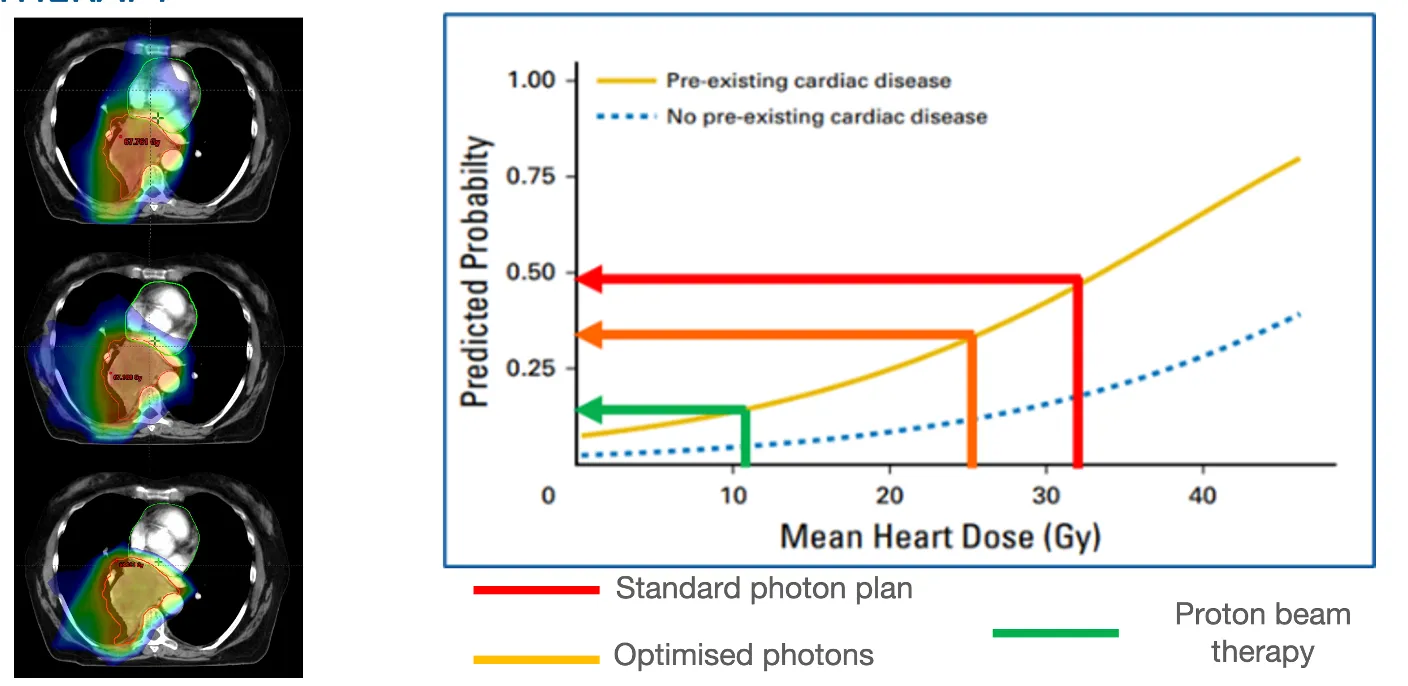Proton Beam Therapy for Lung Cancer: Advanced Care in the UK
Explore proton beam therapy for lung cancer – a precise treatment. Dr. Wilson offers expert care in London. Contact us for tailored treatment options.


Understanding Proton Beam Therapy
Proton beam therapy for lung cancer is a highly advanced form of radiation treatment that uses high energy protons to destroy cancer cells. Unlike traditional radiation therapy, which uses X-rays (photon beams), proton therapy delivers its energy directly to the target volume (the tumour) with high precision.
This precision is made possible by the Bragg peak effect. It means that most of the proton's energy is released at a specific depth inside the body, reducing the exit dose and sparing surrounding healthy tissues.
It is an effective treatment option for early-stage and advanced lung cancer, particularly when tumours are near vital organs like the spinal cord or heart.
What Makes Proton Therapy Unique
Proton radiation therapy provides a different radiotherapy dose distribution than photon radiation therapy. This helps protect the healthy lung, heart, and spinal cord from excess radiation exposure.
It can allow oncologists to deliver a higher dose to the tumour with the goal of improving clinical outcomes and possibly increasing the survival rate.
Thanks to technologies like pencil beam scanning, treatment is shaped closely to the gross tumor volume, helping minimise impact on surrounding tissues.
Its Role in Lung Cancer Treatment
Proton beam radiotherapy plays an important role in the treatment of lung cancer, particularly non-small cell lung carcinoma (NSCLC) and small cell lung cancer.
It may be offered when other therapies are unsuitable or alongside concurrent chemotherapy. It is also considered in clinical trials exploring newer combinations and approaches for locally advanced NSCLC.
Proton therapy has also been studied in patients with lymph node involvement and centrally located lung tumours where precision is key. It is often used to treat areas of the body that have had radiotherapy before (e.g. people who have had previous breast cancer of have a recurrent lung cancer).
Benefits for Lung Cancer Patients
Precision and Reduced Side Effects
Proton therapy delivers less radiation to surrounding healthy tissues, especially the healthy lung, oesophagus, and heart. As a result, fewer side effects are expected, although not always seen in every case.
Because of the precise dose of radiotherapy, patients may tolerate higher dose treatments more safely. This is especially helpful in dose escalation strategies studied in recent clinical studies.

Suitability for Early and Advanced Stages
This type of high-dose radiation treatment is well suited to both early-stage and locally advanced lung cancer. In early-stage NSCLC patients, proton therapy can be a curative alternative to surgery or stereotactic body radiation therapy.
In advanced lung cancer, proton therapy can be used to treat lung tumours close to the spinal cord or heart while minimising risks to nearby structures.
How Proton Therapy Works
The Science Behind Proton Beams
Protons are charged particles. When directed at cancer, they release energy directly into the tumour, stopping shortly after. This sharpens the treatment plan and avoids unnecessary radiation beyond the tumour.
This allows for accurate treatment shaped to the tumour’s size, shape, and location using proton plans tailored to each patient.
Treatment Delivery Process
Your journey begins with detailed CT scans and imaging. These help your radiation oncologist design a personalised treatment plan using advanced planning software.
Treatments are typically delivered at a specialist Proton Center. A full course of treatment may involve daily visits over 1 to 7 weeks, depending on your cancer type and clinical practice guidelines.
Dr. James Wilson: Leading Proton Therapy Expert
Specialised Lung Cancer Expertise
Dr James Wilson is a UK-based Consultant Clinical Oncologist with a specialist interest in Radiation Oncology and lung cancer treatment.
He treats lung cancer patients using the latest evidence-based approaches, including proton beam therapy for lung cancer, in London's leading private facilities.
Oxford-Trained Oncologist
Dr Wilson trained at the University of Oxford and has held appointments at University College London Hospitals and major Cancer Centres in the UK and US.
He regularly reviews emerging clinical studies from centres such as MD Anderson and works to integrate these into UK cancer care.
Access to Advanced Facilities
Dr Wilson provides care through premier clinics in London, with access to a state-of-the-art Proton Treatment centre. Private patients benefit from rapid access and flexible scheduling.
Personalised Care Approach
Patients receive a fully personalised approach. Dr Wilson works closely with your specialist team, including clinical nurse specialists, to ensure you and your loved one feel fully supported.
Tailored Treatment Plans
Each patient’s treatment plan is unique. Factors considered include tumour location, lung function, general health, and past treatments.
Comprehensive Patient Support
Support extends beyond treatment. Dr Wilson’s team can help with appointments, travel, emotional well-being, and navigating options for clinical trials.
Side Effects and Management
Potential Side Effects
While proton beam therapy for lung cancer is precise, side effects can occur. These might include:
-
Mild fatigue
-
Shortness of breath
-
Cough or chest discomfort
-
In some cases, adverse events like inflammation of the lung or oesophagus
Most side effects are temporary and can be managed effectively. The long-term side effects will be discussed with you in detail before you make a treatment decision.
Strategies for Comfort and Recovery
You will have regular reviews with Dr Wilson and access to your care team. They help manage symptoms quickly and provide supportive therapies where needed.
Comparing Proton Therapy to Other Treatments
Proton Therapy vs Traditional Radiation
Unlike photon therapy, which releases energy throughout its path, proton beam radiation therapy deposits its energy at the tumour site only. This results in less radiation to surrounding tissues.
Studies comparing intensity-modulated radiation therapy with protons show more favourable dose distribution in many dosimetric studies.
Integration with Chemotherapy or Surgery
In some cases, proton therapy may be given after thoracic surgery or with concurrent chemotherapy. This approach can support better clinical outcomes in selected eligible patients.
Accessing Proton Therapy in the UK
NHS and Private Care Options
Proton therapy is available via the NHS for select cancer types. For lung cancer, access is limited.
Dr Wilson provides private care at a leading Medical Center in London, offering faster appointments, access to proton radiotherapy, and shorter waiting times.
Benefits of Private Care with Dr Wilson
-
Rapid diagnosis and CT scan and PET scan bookings
-
Coordination with top Consultant Respiratory Physicians and Thoracic Surgeons
-
Personalised care from a dedicated lung cancer team
-
Access to emerging clinical trials
Research Supporting Proton Therapy
Key Studies and Findings
A systematic review showed that proton beam therapy for advanced lung cancer can reduce radiation does to normal tissues and could therefore reduce toxicities compared to traditional therapies in carefully selected patients.
Other research supports its value in dose escalation, maintaining progression-free survival and which could improve median OS (overall survival) in some groups.
Future Directions in Lung Cancer Care
As more clinical trials emerge and technology improves, proton therapy may become a standard option for more types of thoracic cancers, including esophageal cancer and neck cancer.
Patient Experiences
Success Stories with Proton Therapy
Many patients appreciate the shorter recovery time, fewer expected side effects, and personalised support. These factors often improve confidence and outlook.
A patient of mine was told that she could not have radiotherapy given with the intent of cure. With PBT, we were able to safely achieve what she thought impossible - a curative approach.
Emotional and Practical Support
Coping with a cancer diagnosis is never easy. Dr Wilson and his team are here to guide you through each step, providing both medical and emotional support tailored to your needs.
Frequently Asked Questions
Who is eligible for proton therapy?
Patients with early-stage or advanced NSCLC, secondary lung cancer, or tumours near sensitive structures may benefit. A full assessment is needed.
How long does proton therapy treatment take?
A typical course is up to 6 and a half weeks. Daily sessions (weekdays only) last 30 to 90 minutes.
What are the costs of proton therapy in the UK?
Private proton therapy is individually priced. Dr Wilson’s team can provide detailed guidance and help you understand insurance coverage and payment options. A detailed quotation will be provided before you make a treatment decision.
Connect with Dr. James Wilson
Schedule Your Consultation
To explore proton beam therapy for lung cancer, contact Dr James Wilson:
-
Phone: +44 (0)20 7993 6716
-
Email: info@drjameswilson.co.uk
-
Contact form here
-
Professional referrals - click here
London Clinic Locations
Appointments available at leading centres, including The London Clinic and partner Cancer Centers offering Proton Therapy Treatment. I offer patients proton beam therapy for lung cancer at Proton International London.